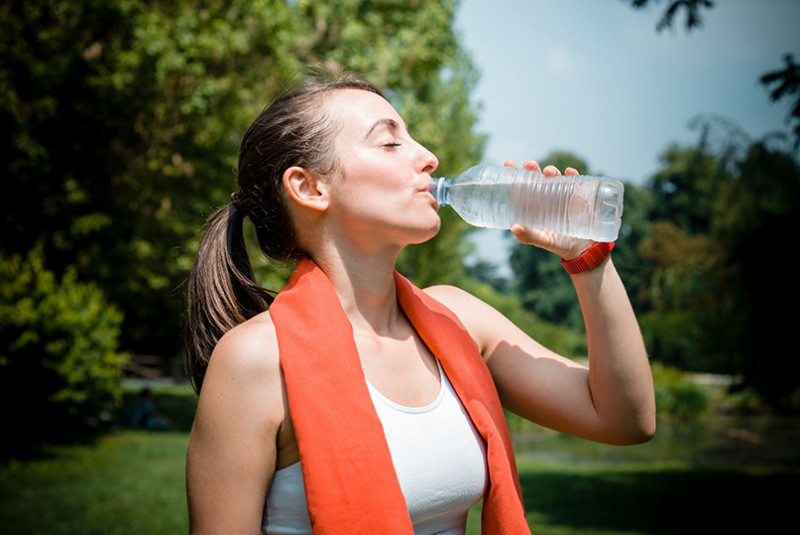Summer is in full bloom, meaning it's about as hot as it's going to get this year, and many of us are outdoors more regularly, perspiring more than usual. Some of us are more active now than in any other season. Even if we are not, we are probably outside more than we are otherwise accustomed to, and water is leaving our bodies quicker than normal. So, what does all this mean? For one thing, it means we need to stay especially alert when it comes to staying hydrated. As in keeping our bodies properly fed in terms of H2O. This especially holds true for the exercise and athletic enthusiasts among us, where sipping water or some other hydrating fluid before, during, and after exertion comes highly recommended. Staying properly hydrated is more important than you may think. Our bodies consist of about 75 percent water, and it's always craving more. As it should be – your body must have water to survive. In order for each to function properly, every cell, tissue, and organ in your body needs water. Per health.com, your body uses water to maintain its temperature, to get rid of waste and to keep your joints lubricated. Without water, our overall health is affected, and quickly. Every single cell in your body needs fluid to function properly, says Dr. Angie Eakin, a Washington, D.C.-based family physician, quoted at health.com. That's why even mild dehydration can make you irritable, foggy-headed, and headachy. As annoying as those symptoms might be, they can be a whole lot worse, leading to more serious problems such as migraines and dizziness and, worse yet, severe dehydration accompanied by confusion, extreme thirst, and absence of urination – all of which point to a trip to the emergency room being in your very near future. Wait any longer and maybe you have no future. Not good. Note: per everydayhealth.com, dehydration is also a major risk factor for developing kidney stones, which affects one out of every 11 adults. Signs of possible dehydration, per familydoctor.org:
- Little or no urine
- Darker-than-usual urine
- Dry mouth
- Sleepiness or fatigue
- Extreme thirst
- Headache
- Confusion
- Dizziness or lightheadedness
- Lack of tears if crying
How Much Water Should We Drink/Eat?
The mention of Eat in the subtitle above is correct. A number of foods are packed with water and do a great job in helping us to stay or get hydrated, even if we are not aware of it. As for drinking water, and in what quantity, one rule of thumb often mentioned is 64 ounces a day, or eight 8-ounce cups of water. There's nothing wrong with sticking to that directive, but is it really accurate, and, besides, who exactly says 64 ounces is the scientifically mandated target number? Fact is, there really is no such thing. Consider it just good advice, and the point is to just consistently drink water. Another suggestion gaining traction in the health-care field is to drink when thirsty. When your thirst is quenched, you can stop drinking water – for now. And if your urine is colorless or light yellow, you should be just fine, per familydoctor.org. Sports drinks – not to be confused with energy drinks (do you ever wonder what's in those energy drinks?), which typically contain beaucoup caffeine - can be especially helpful when you are exercising for an hour or more. They not only replenish your fluids and therefore aid in hydration, they also provide a dose of carbohydrates and electrolytes that help give you an extra boost of energy, a good a thing for athletes and those who frequently exercise.Foods That Are Good for Hydration
There's no question that keeping a bottle of water handy all day from which to sip is a great habit. When it's empty you can get it refilled at the sink, water cooler, etc., assuming that the source provides clean, properly filtered water. It's possible to eat your way to healthy hydration – or at least to supplement your water intake. Here are some water-filled foods and potables worth adding to your diet for hydrating purposes:- Watermelon. No surprise here, and this just might be the No. 1 summertime snack of all time. Per dailyburn.com, watermelon is a fruit that is comprised of 92 percent water as well as a good source of salt, calcium, and magnesium, meaning it gets bonus points for being a great food for rehydration.
- Iceberg lettuce. It's 96-percent water and a great ingredient for healthy salads.
- Strawberries. These tasty treats work just fine even without the whipped dream or shortcake, being that they are 92 percent water and full of fiber and vitamin C. Eat up!
- Cucumbers. Here's another veggie that checks in at 96 percent water and void of saturated fat or cholesterol. Eat these up, too!
- Coconut water. Low on carbohydrates, rich in potassium, per dailyburn.com. A tropical drink that hydrates well – sounds nice, doesn't it?
- Cauliflower. 92 percent water.
- Spinach. 91 percent water.
- Skim or fat-free milk. Canadian researchers, per ScienceDaily, have concluded that such milk is better than water or a sports drink when it comes to rehydration. This kind of milk has been found to be a good source of high-quality protein, carbohydrates, calcium, and electrolytes.

